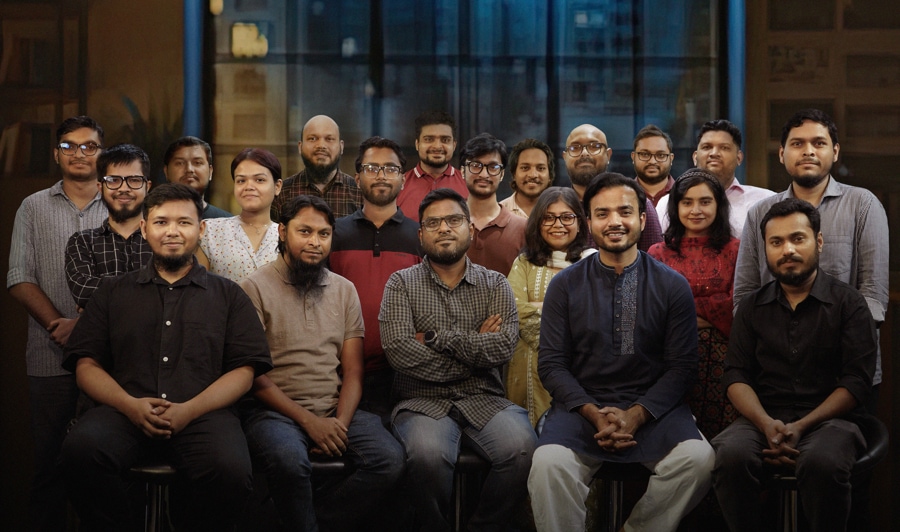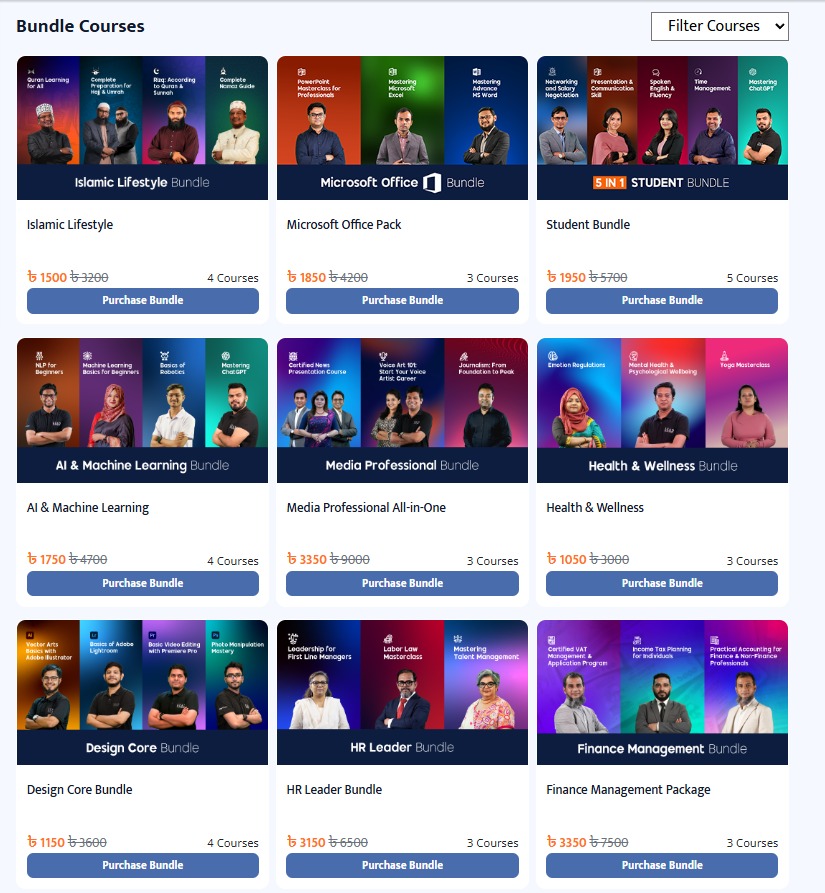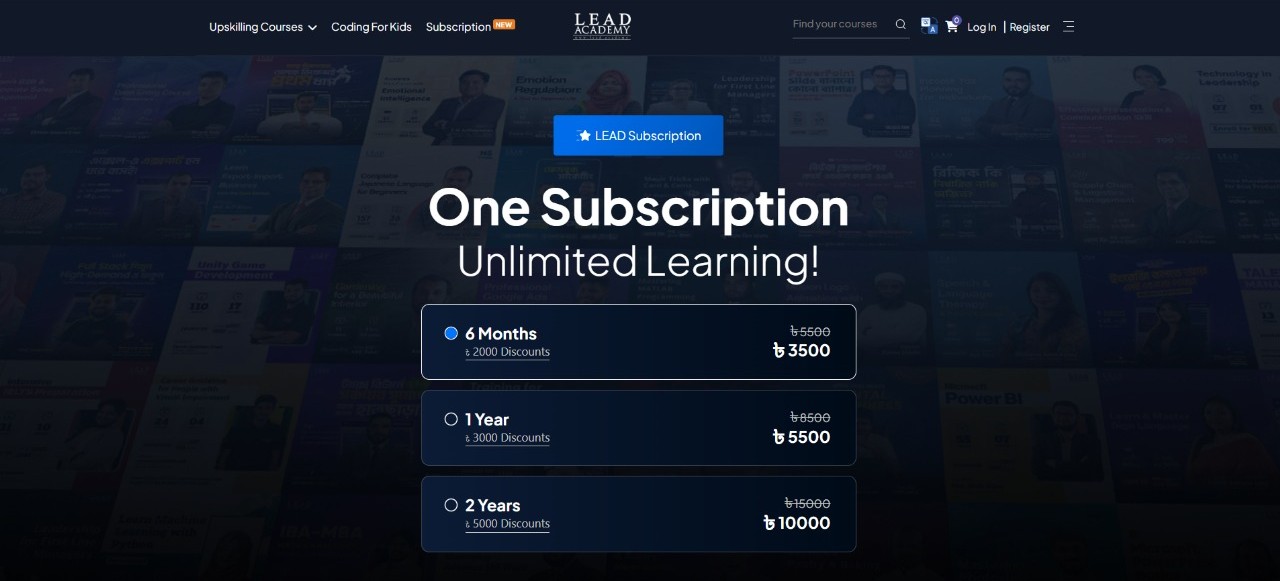In a rustic poised on the cusp of a demographic dividend, Bangladesh faces a urgent problem: an schooling system struggling to maintain tempo with the calls for of a quickly evolving international economic system.
With a inhabitants of over 170 million, 70% of whom reside in rural areas, the nation grapples with a big hole between educational coaching and {industry} wants, a scarcity of structured expertise schooling, and restricted alternatives for underserved teams, together with individuals with disabilities.
Enter Lead Academy, a Dhaka-based edtech startup that has emerged as an necessary participant, addressing a few of these systemic challenges with a novel mannequin that prioritizes high quality, accessibility, and influence. Based by Ashfaq Zaman, a UK-educated schooling fanatic, and Sharif Ahmed, a software program engineer turned entrepreneur, Lead Academy blends prime quality and industry-aligned curricula, cutting-edge expertise, and a deep dedication to inclusivity.
This text explores how Lead Academy has crafted a particular strategy to delivering high-quality on-line schooling, setting itself aside in a rising and crowded market.
The Genesis
Lead Academy’s origin story is rooted in a clear-eyed recognition of Bangladesh’s instructional ache factors. Ashfaq Zaman, who spent his adolescence within the UK earlier than returning to Bangladesh, recognized three core issues.
First, there’s a persistent disconnect between academia and {industry}, leaving graduates under-prepared for the abilities demanded by employers.
Second, the absence of structured platforms for well timed upskilling limits professionals’ capacity to remain aggressive in a fast-changing job market.
Third, expertise schooling, notably coding and STEM (Science, Expertise, Engineering, and Arithmetic), is nearly nonexistent on the faculty stage, particularly in public establishments, leaving younger learners ill-equipped for a tech-driven world.
These gaps are compounded by the exclusion of individuals with disabilities, who face near-total boundaries to schooling and employment.
Zaman’s imaginative and prescient for Lead Academy was born from a perception that schooling is the “passport to the longer term” and a determinant of a nation’s trajectory. After coming back from the UK, he joined forces together with his childhood good friend and co-founder Sharif Ahmed to start out Lead Academy.
Lead started with a concentrate on larger schooling, coaching over 1,500 college schools throughout Bangladesh in trendy pedagogy, activity-based studying, and flipped classroom fashions by a World Financial institution-funded Institutional High quality Assurance Cell (IQAC) program.
Nevertheless, the COVID-19 pandemic modified the corporate, prompting a pivot to on-line studying. It started with pre-recorded programs after which expanded into K1–K12 STEM schooling by its subsidiary Dreamers Academy, making a complete platform that covers the total studying lifecycle. The promise—very best quality on-line schooling in Bangladesh.
The High quality Drawback in EdTech
Delivering high quality schooling on-line is a problem. Most on-line schooling confuses data supply with studying, chasing engagement, time on platform, course completions, month-to-month lively customers, and so forth. The idea is that extra engagement equals higher studying. However none of those resolve the core problem: how do you make sure that somebody who completes a course can truly carry out the abilities they supposedly discovered?
Ashfaq Zaman, Lead’s co-founder, skilled this hole firsthand. After coaching 1,500 college school members throughout Bangladesh by IQAC packages, he watched graduates enter the workforce utterly under-prepared for the skilled world of labor. The schools taught principle. The job market demanded sensible expertise. The hole between the 2 was rising wider yearly.
Conventional options concentrate on the mistaken finish of the issue, attempting to make content material extra partaking, accessible, and gamified. However engagement with out studying is simply leisure.
Lead took a distinct strategy: working backwards from desired outcomes. The corporate began with the belief that high quality schooling produces measurable real-world outcomes, and all the things else is simply vainness metrics.
Three years later, the corporate has constructed a complete instructional platform, serving 55,000 learners with a 60% course completion fee and demonstrable job placement success.

Working Backwards From Outcomes
Here is how most EdTech firms take into consideration high quality:
- Create partaking content material
- Optimize for completion charges
- Measure consumer satisfaction
- Assume studying occurred
Lead Academy reversed this course of:
- Outline particular, measurable outcomes
- Design evaluation strategies that confirm actual competence
- Construct content material that produces these outcomes
- Optimize the complete system for consequence achievement
Whereas this appears apparent, it is remarkably uncommon in observe. It requires answering uncomfortable questions: What precisely ought to a scholar be capable of do after finishing this course? How will we confirm they will truly do it? How will we all know if they will apply these expertise in real-world contexts?
Most EdTech firms keep away from these questions as a result of they’re tough to reply and costly to implement.
Lead Academy has constructed its complete enterprise mannequin round answering them. The corporate sought to engineer a system to unravel 4 frequent failures within the schooling market:
The credibility hole: Certificates from on-line programs are noise. Employers ignore them. To handle the credibility hole, the corporate works with skilled instructors (7-8 yrs min. expertise) instructing job-specific expertise, points blockchain-verified certificates and granular talent assessments. This implies employers belief credentials, which in flip incentivize new learners to hunt out Lead.
The completion hole: 95%+ of learners abandon MOOCs. Lead has constructed a layered accountability stack to unravel the completion hole. The AI—powered personalization permits for real-time talent mapping, customized studying paths, and reduces abandonment. Human oversight by way of scholar relationship managers monitor progress and intervene at drop-off factors. Lastly, lock-ins by interactive project-based milestones creates momentum. Final result: 60% course completion. Completion isn’t motivation-driven; it’s a system output. Take away friction, add accountability, and completion rises.
The localization void: World platforms can’t deal with Bangladesh’s distinctive constraints (infrastructure, language, jobs). Bangladesh’s boundaries aren’t flaws to repair — they’re design constraints: low bandwidth, gadget entry, intermittent electrical energy. To deal with these challenges, Lead presents a mobile-first, low-data video streaming platform and the corporate says it’s engaged on an upcoming offline obtain functionality. The corporate treats infrastructure gaps as inputs, not obstacles. This has turned localization from a value middle right into a moat.
The inclusion blindspot: Disabled and rural learners are excluded by design. In partnership with NGOs (Friendship), Lead has scaled its answer to chars (coastal areas) and locations like Cox’s Bazar, offering coding schooling to underprivileged kids, notably women. Lead designed for the toughest instances first. Signal language programs, screen-reader suitable LMS for blind/deaf learners. Speech remedy/cognitive modules for autistic kids. Fixing edge instances pressured sturdy UX design.
A Multi-pronged High quality Framework
Lead Academy’s definition of high quality schooling is each bold and nuanced, designed to fulfill the wants of various learners whereas aligning with international requirements. In the end, high quality is measured by influence: jobs landed, expertise gained, and lives remodeled, from distant coastal kids studying to code to alumni founding startups. Lead Academy’s strategy rests on a number of interconnected pillars, every addressing a distinct side of the standard downside:
Pillar 1: Professional-Pushed Content material Creation
The primary pillar tackles the authority downside. Who ought to create instructional content material? Most platforms optimize for value and availability, resulting in a race to the underside in teacher high quality.
Lead Academy established inflexible choice standards:
- Minimal 7-8 years of actual {industry} expertise
- Verified skilled status by LinkedIn and references
- Demonstrated experience by portfolio assessment and demo movies
- Dedication to structured content material improvement course of
This ensures that course creators have truly solved the issues they’re instructing others to unravel. The distinction between theoretical data and sensible experience is big, and it exhibits up instantly in content material high quality.
However experience alone is not sufficient. Area consultants generally make horrible lecturers. Lead Academy addresses this by its content material improvement course of. Business consultants work with the product workforce to validate course outlines towards actual market wants. Theoretical ideas are paired with sensible case research and real-world situations. And every course receives film-level manufacturing remedy, as a result of visible high quality straight impacts studying effectiveness.

Pillar 2: Business-Aligned and Dynamic Curriculum and Course Design
Lead Academy’s curriculum design course of is equally meticulous, making certain alignment with {industry} wants and learner expectations. Market analysis informs course outlines, whereas suggestions from the coed neighborhood shapes content material throughout planning. The design course of includes a product improvement workforce, {industry} skilled instructors, and a devoted editors’ workforce, making certain readability and relevance.
Programs are revised each six months primarily based on suggestions, with new content material added yearly to maintain tempo with {industry} traits. Theoretical content material is balanced with sensible purposes, pairing ideas with real-world examples to boost applicability. To take care of native relevance, instructors with on-the-ground expertise design content material, supplemented by steady market analysis.
Pillar 3: Verification-Based mostly Credentialing
How do employers know that somebody who accomplished a web-based course truly discovered the fabric? Most platforms subject certificates that show completion, not competence. Lead Academy constructed a blockchain-based credentialing system that verifies particular expertise somewhat than course completion.
Here is the way it works: As an alternative of “John accomplished the Accounting course,” employers can confirm “John scored 85% on tax preparation, 92% on VAT calculations, and 78% on chart of accounts administration.” The credential breaks down competency by particular talent areas, giving employers granular perception into what somebody can truly do.
This method creates highly effective incentives. College students cannot recreation their approach to credentials—they need to display precise competence. Instructors cannot create superficial content material—it has to supply measurable talent improvement. Your complete system aligns round studying outcomes somewhat than completion metrics.
Pillar 4: Systematic High quality Assurance
The ultimate pillar tackles the consistency downside. How do you preserve high quality requirements throughout lots of of programs and hundreds of scholars?
Lead Academy’s high quality assurance framework includes pre-review, modifying, post-review, and neighborhood suggestions, third-party audits, and neighborhood assessment teams, making a steady enchancment loop. Scholar success is tracked by suggestions, LinkedIn monitoring, scores, evaluations, and success tales.
Every stage has particular standards and checkpoints. Content material cannot transfer to the following stage with out assembly high quality requirements. This creates a scientific strategy to high quality that does not depend upon particular person judgment or motivation.
This relentless concentrate on high quality has created a rising collection of success tales. Kids from distant coastal colleges, supported by the Friendship NGO, are studying to code; alumni are founding startups and nonprofits; and graduates are pursuing international STEM careers. And successful at competitions similar to ICT Olympiad and NASA Area Olympiad.
AI-powered Personalization Engine
High quality schooling is not one-size-fits-all. High quality schooling additionally has to deal with the customized studying problem. However most personalization makes an attempt concentrate on content material suggestion somewhat than studying optimization. Lead Academy constructed their personalization round studying effectiveness by making use of the facility of AI. AI tracks studying velocity of scholars and adjusts content material supply velocity, helps determine data gaps and gives focused remediation, matches studying paths to particular job necessities, and AI chatbots present fast assist whereas human mentors deal with advanced points.
Personalization ought to optimize for studying outcomes, not engagement metrics. Typically the simplest studying expertise is difficult and uncomfortable. Good personalization techniques ought to be capable of push college students once they want pushing, not simply give them what they need.

The Unit Economics of High quality
Most quality-first approaches fail as a result of they do not scale economically. Excessive-touch, outcome-focused schooling appears incompatible with worthwhile unit economics. Lead Academy solved this by strategic automation and partnerships.
AI handles routine duties (progress monitoring, primary Q&A, content material suggestion) whereas human consultants concentrate on high-value interactions (advanced problem-solving, profession steerage, talent evaluation).
As an alternative of pure direct-to-consumer scaling, the corporate works with NGOs, colleges, and firms to distribute its programs. This reduces buyer acquisition prices whereas rising influence.
Lead was first in Bangladesh to supply true subscription entry to its full course catalog, creating predictable income whereas giving college students flexibility.
Wanting Forward
Wanting forward, Lead Academy goals to proceed to develop its Bangladesh operation whereas seeking to alternatives to develop globally. Over the following 5 years, the platform goals to serve half 1,000,000 learners. On the product facet, plans embody extra superior AI personalization, and a blockchain-backed hiring ecosystem to additional synchronize learner and employer wants. Inclusive schooling will stay a precedence, with expanded choices for individuals with disabilities and underserved communities.
To scale high quality, Lead Academy will automate high quality assurance with AI, preserve low mentor-learner ratios, and strengthen buyer help and neighborhood engagement. Partnerships with trusted establishments will allow the platform to achieve distant areas, empowering women and orphans with coding and English expertise.
As Mr. Ashfaque places it, the last word ambition is a future-of-work-ready Bangladesh, with a workforce geared up for the Fourth Industrial Revolution and aggressive on the worldwide stage.

The Broader Sample
What’s attention-grabbing about Lead Academy is the broader sample it represents. The corporate selected to compete on high quality in an {industry} that sometimes competes on worth and comfort. This alternative pressured the corporate to develop completely different capabilities. Systematic high quality assurance as a substitute of viral advertising. Final result measurement as a substitute of engagement optimization. Professional networks as a substitute of content material quantity. Verification techniques as a substitute of completion certificates. These capabilities are more durable to construct however extra defensible as soon as established. They create sustainable aggressive benefits that may’t be simply copied.
Lead Academy’s development suggests a number of necessary classes for the broader EdTech {industry}.
Engagement metrics are simple to recreation however do not correlate with studying. Final result metrics are more durable to measure however create sustainable aggressive benefits.
Content material scales by replication, high quality scales by systematic processes and clever automation. Most EdTech firms attempt to scale content material and hope high quality follows. It would not work.
Employers do not belief on-line credentials as a result of most do not confirm precise competence. Platforms that resolve the verification downside can cost premium costs and create community results.
And at last, serving populations that others ignore typically creates extra sustainable companies than competing for mainstream audiences.
Cowl photograph: Ashfaq Zaman & Sharif Ahmed, Founders of Lead Academy (from Left to Proper)
Keep forward of the curve with Enterprise Digital 24. Discover extra tales, subscribe to our publication, and be part of our rising neighborhood at nextbusiness24.com


